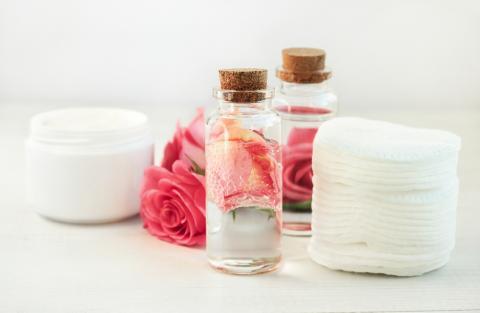
“What’s in a name,” Shakespeare said. And call a rose whatever you want, it will still smell as sweet and be as healthy. So here’s to making your own rose water, and using it for beauty and health…
There must be a reason why Cleopatra bathed in rosewater and ass’s milk. And while I cannot guarantee the virtues of the latter considering I do not know where to find or how to milk a donkey, I can vouch for the many benefits of rose water. You can apply it, drink it, put it in your eyes, rinse your mouth with it, and even add it to many recipes. So for something so vivacious in use, is it tough to make? Nope, easy as, or rather, easier than pie!
Making Your Own Rose Water
Gather as many organically grown and sweet-smelling roses as you can. Remember, we are not looking for the long-stemmed and long-lasting bouquet hybrids here, but the sweetest smelling blooms you can find in your grandma’s garden. There are two ways you can make the rose water: via sunlight and via direct heat. Direct heat can dissolve some of those phytonutrients, though the aromatherapy effects will remain as strong as ever. I have tried making it both ways, and frankly, both worked for me just fine. I make the direct heat one in winters when the sun doesn’t shine all that much. And in summers, I switch to making rose water in the sun.
- Begin with removing all the petals from the stems and washing them under fresh, clean water to get rid of any pollen, dew, or other residue. Give them a rinse with distilled water in the end—or you could use boiled and cooled water for this.
- Making Rose Water On The Stove Top: Place all the petals in a deep-bottomed pan. Pour enough distilled water to just cover the petals, but no more, else the rose water will be pretty diluted. Bring it to a boil and then lower the heat and simmer for 20-30 minutes. All the petals should lose their color and become very limp. Let the mixture cool a bit before you strain the petals out and pour it into a clean glass jar. Put it in the refrigerator to store.
- Making Rose Water Under The Summer Sun: Place the rose petals in a clean glass jar and top it with distilled water. Keep the jar in a sunny place that gets direct sunlight for 2-3 days, till the petals look soggy and discolored. Remove the jar from the sun and strain out the rose water into another clean glass jar.
- Either way, the rose water should last its life—and even if it changes color a bit, it’s good to use. Make sure you take out only as much as you need and store the rest in the refrigerator to give it a longer shelf life.
- In case the mixture starts to smell bad or looks moldy, chuck it out and make a fresh batch. All you need for rose water are roses and water!
The Many Uses Of Rose Water
For Beauty
If beauty experts and aficionados are to be believed, there’s nothing that rose water cannot do, and it’s like the Wonder Woman of the Justice League. That said, roses are rich in anti-inflammatory, antioxidant, and antibiotic properties—and so is rose water. So you can apply rose water directly to your skin as and when you like—be it early in the morning or at bedtime. You can spray it on your skin, bathe in it, or splash your face with it. It soothes any inflammations, cleans out the pores, helps keep infections at bay and helps you look a tad bit more well-kept and youthful than before. Obviously, it is not magic. It will not take away any long-term scars or manage to keep oily-skin breakouts at bay. But it will improve the quality of your skin and keep it fresher, more vitalized, and stronger from the inside out. One tip is to add rosewater to any DIY beauty mask, pack, or scrub you make. Along with all the skin benefits, the scent alone calms you down into a relaxed place. And in case you run out of mouthwash, rinse with rose water instead and smell as sweet as a rose!
For Aromatherapy
Our olfactory sense is pretty strong, which is why some scents work toward calming us while some send us into a tizzy. Rose water is a big mind influencer—it lowers your stress levels and makes you feel better on bummed out days like when you are afflicted by the PMS blues. Rose water does relax you, and if you spray some on your sheets, it may help you get a good sleep as well. But simultaneously, if you spray your face with some rose water during your afternoon slump, it can actually increase concentration and alertness. It’s also a powerful aphrodisiac and the scent may put you in the mood just like that.
For Health
You can even drink rose water, and in fact, if you are partial to drinking rose syrup, then you are drinking rose water mixed with edible red color and sugar. The antioxidants in roses and rose water make it a healthy thing to drink, especially if you drink a cup a day as is, minus any added sugar. The water tastes naturally sweet because of the sugars present in rose. While the research is preliminary, health experts do claim that rose water contains many nutrients such as vitamins A, C, D, E, and even B3, which can aid in lowering cholesterol. Its antioxidants keep cellular damage (what causes us to age internally and externally) at bay, plus it may also aid in digestion, thereby preventing IBS and constipation. Rose water can also have a bronchodilator effect which means it can help you in fighting off a cold, the flu, or even a sore throat. Since it is anti-inflammatory, it helps in decreasing bloating and water retention. It can also aid in balancing the hormones, especially in menopausal women. All you need to do to get these awesome benefits is drink a cup of rosewater on an everyday basis—but only the homemade organic kind.
For Hair
Rose water’s pH is healthy for the hair and scalp, so it can help repair the damage caused by environmental factors or harsh chemicals. While some claim that a rose water rinse promotes growth, there’s no scientific evidence of it. But yes, the delicate scent of the rose water will linger, and its anti-inflammatory and antiseptic action can help in reducing dandruff and other scalp issues. Plus, it does make the hair feel softer and look shinier.
For Eyes
For a person who wears contact lenses, and has been wearing them for long hours for more than 15 years now, I can say my eye surface is remarkably free of any scratches or infections. I also do not have dry eyes, despite my long hours on the laptop. The credit lies with rose water. I put two drops of rose water in each eye on a daily basis, before I don my lenses. The days my eyes are strained, the rose water stings. But on any given day, it relaxes my eyes and makes me feel fresh. If you are worried about putting non-prescribed drops in your eyes, do this instead: soak two cotton pads in cold rosewater. Lay back and put the pads over your closed eyes for five minutes—your eyes will look and feel remarkably brighter.
So bathe in it, drink it or just spritz it around you—rosewater does you and your mental balance a whole lot of good on any day. Plus, you can also flavor your desserts, teas, and even coffees with it for some added aromatherapy.
If you have any rosewater hacks to share with us, do write to us in the comments section below—we’d be delighted to hear from you!








